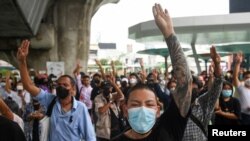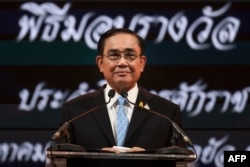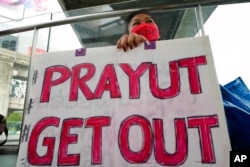Thailand's top court ruled Friday that Prime Minister Prayut Chan-ocha can keep his job at least until next year's elections, settling a legal dispute that echoes the country's deep political fault lines and dashing the opposition's latest bid to remove the 2014 coup leader from office.
The military-drafted constitution of 2017 caps a prime minister's time in the job at eight years.
In a 6-3 decision, the Constitutional Court said the clock on Prayut's time in office started ticking Aug. 6, 2017, the day the charter took effect. The court had suspended him from the job when it took up the case last month.
Friday's ruling both reinstates Prayut and clears the way for the ex-general to run for reelection in polls set for May and, should he win, to serve until 2025. He won a disputed vote for prime minister in parliament in 2019 thanks to the votes of senators appointed by his own junta.
"The tenure of the accused [Prayut] from April 6, 2017, to August 24, 2022, has not reached its limit and the court rules by a majority vote that his premiership has not ended in accordance with the 2017 constitution," the court said Friday.
August 24, 2022, was the day the opposition parties that filed the court case say Prayut's term should have ended. That's exactly eight years after he was officially endorsed by then-King Bhumibol Adulyadej as prime minister of the military leadership that toppled an elected government months earlier. The parties argued that his years at the helm of the junta should count toward the eight-year cap.
Legal experts in the opposition's corner also pointed to a clause in the constitution that says the cabinet in place just before the charter takes effect — the prime minister included — will remain the cabinet just after it takes effect and until the next election, implying continuity.
Prayut's boosters disagreed. They argued that the years before the constitution took effect could not count toward the eight years and that his official time in office started either in 2017 with the new constitution or in 2019, after the elections.
In a Facebook post just after the ruling, Prayut thanked his supporters and said he would focus his efforts on developing the country.
Prayut's legal adviser, Wira Rojanawas, said his client would return to his full duties as prime minister Monday and urged his critics to respect the court's verdict, according to local media.
Spokespersons for the government did not immediately answer VOA's calls or answer requests for comment.
'Disappointed but not surprised'
Pita Limjaroenrat, the leader of Move Forward, one of the parties that filed the case, told VOA he was "disappointed but not surprised" by the court's decision. He counts three prior occasions in which the court, most of whose members were appointed since the coup, has saved Prayut from having to step down.
In 2019 it rejected a case claiming Prayut was a state official while heading the junta, which would have disqualified him from running for prime minister earlier that year. It also upheld his right to live in army housing even after leaving the military and bowed out of deciding whether he was a legitimate prime minister despite failing to recite the full oath of office after the 2019 elections.
Prayut's critics accuse him of toppling a legitimate government in 2014 and ruling with an iron fist even after the 2019 polls.
In the wake of that election, several pro-democracy activists were beaten in public by masked men in a spate of attacks that have yet to be solved. Academics, advocates and activists especially critical of the government have reportedly had their phones hacked with sophisticated Israeli spyware — only other governments are believed to possess— though the Thai government has denied any involvement.
Through much of 2020, mass protests rocked the capital, Bangkok, with calls for Prayut to resign and for reform of the monarchy, which critics accuse of helping to prop up his military and civilian governments. Police repeatedly used rubber bullets, water cannons and pepper spray to push back protesters. Hundreds have been arrested and charged with crimes. Authorities said they were using proportionate force to maintain order.
But Pita said the court's decision Friday portends more of the same.
"If nothing is done ... it's total chaos in terms of abuse of power, in terms of rule of law, as well as economic conditions here in Thailand," he said. "It means that a majority of politicians are too concentrated or focused on remaining in power."
Focus on upcoming elections
Analysts say anti-government protests, which died down as the COVID-19 pandemic dragged on, may pick up again, but only slightly, and won't reach the pitch of 2020.
Titipol Phakdeewanich, dean of the political science faculty at Thailand's Ubon Ratchathani University, said opposition parties will not want to encourage the protests either, for fear of triggering another coup.
"The opposition, like Pheu Thai and Move Forward, they are also focusing on elections, so I don't think they would want to put too much energy [into] mobilizing a large-scale protest ... because it could also set a pretext for military intervention like what we have seen in the past," he said.
But Khemthong Tonsakulrungruang, a lecturer and constitutional law expert at Thailand's Chulalongkorn University, said opposition parties could still use the court's decisions from Friday and earlier to build support.
"The opposition parties [are] going to capitalize on all these decisions and ask the people to vote Prayut out," he said.
That assumes Prayut will run, as some analysts expect him to. While his party, Palang Pracharath, has not yet named its candidate for prime minister, Prayut himself has hinted at making another run.
It won't help his case that he will be able to serve only half the four-year term, Khemthong said. Then again, he added, the same junta-appointed Senate that helped vote Prayut into office in 2019 could help either keep him there or vote in someone else of the military's liking in 2023.
"So, a change in [the] government is not like a shift or a change in the regime," he said.







